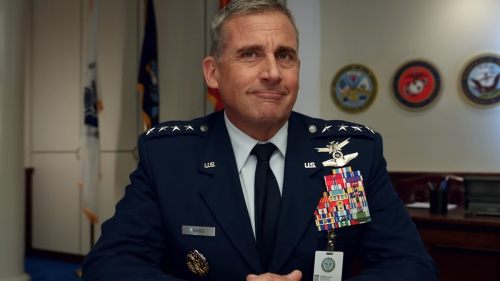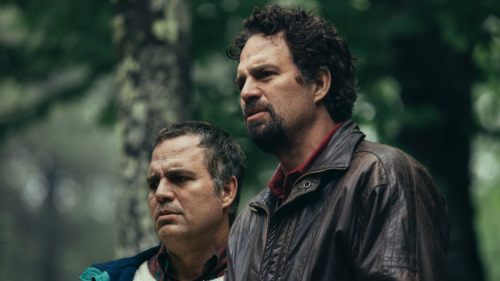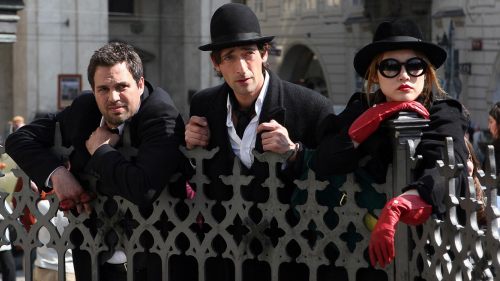FOXCATCHER Movie Review: Two Great Performances In A Chilly Tale of Murder
We like stories where people snap after some inciting incident bends them too far. It’s comforting to see this - there’s a reason for this terrible killing, a starting point for this senseless crime.
But in reality it’s not often that simple. Most people who break are like a roof covered in snow; the snow accumulates over time, one flake at a time, but when the roof collapses it wasn’t the weight of one flake that did it - it was the cumulative effect of all that snow for all that time.
This is Foxcatcher.
Steve Carell plays a Ben Stiller character escaped from a sketch; he’s John du Pont in a big fake nose and slumped shoulders, an heir to America’s greatest family fortune and a total weirdo. Du Pont has whatever he wants - the guy is so fucking rich he casually blows lines of coke on his private copter on the way to delivering a speech to a gun rights group - but he can’t buy the two things he most desires: a youth spent in wrestling and a friend.
But this isn’t du Pont’s story. And it isn’t the story of the man he killed. It’s the story of a third man, and the choice to focus on Mark Schultz - 1984 Olympic wrestling gold medalist - turns Foxcatcher into a very different sort of movie than we might expect. It’s based on a true story, after all - we know from history that du Pont killed Schultz’ brother Dave, also a wrestling gold medalist. The film treats this as a matter-of-fact event at the end (and even downplays the drama of the event - in real life du Pont had a two day standoff with the cops) and focuses instead on the path to the murder. The police were never able to establish a motive for the murder, but the movie - in its own subtle way - tries.
Channing Tatum is Mark Schultz, a blockheaded ape who wrestles. This is what he is, a wrestler. He grapples not with the world around him but with the men in the ring with him; he seems incapable of processing his feelings in any way, and he’s only able to open up - marginally - to his older brother Dave. But he’s stuck in Dave’s shadow; while both are medalists Dave was the first to win, and he’s established a family and a career as a coach. Mark sits home alone, eating ramen from Tupperware, looking longingly at a picture of Washington crossing the Delaware. When du Pont (whose family earned their wealth supplying arms to Washington in the Revolution) enters his life - looking to build a wrestling team at his ancestral home of Foxcatcher Farms - it’s a perfect opportunity for Mark to do his own thing, to build his own legacy.
Tatum is often excellent in the role, physically changing himself to be this lumbering man who walks with his arms weirdly, daintily dangling in front of him (all the main characters do this, like some kind of odd gorillas). Sometimes he falls into ACTING - there are scenes where he’s walking across a room where he’s so clearly trying to walk IN CHARACTER that it’s stiff - but for the most part Tatum explodes past our expectations and finds the wounded heart of this bulk of a man. This is the hardest kind of character to play, the kind who doesn’t tell us how he feels, who doesn’t know how to deal with any of his emotions. This is especially tricky as the relationship between du Pont and Mark falls apart quickly and without much explication.
Mark Ruffalo is extraordinary as Dave. The best actor in the trio, he seamlessly weaves the physicality of this wrestler (who, while old, is not past his prime by any means, and even wrestles in the film) with the interior life of the man. He’s a great coach, a good man - maybe a touch saintly - and the character least likely to be involved in the tragic shooting at the end of the film. His scenes with Tatum are honest and often touching in their displays of low-key brotherly love. There’s a physicality to the way wrestlers relate that Ruffalo gets perfectly.
That physicality can be homoerotic, and the movie makes an argument that this is what’s at the center of all of du Pont’s final madness. He loves Mark, and he brings him into the family portrait gallery for after midnight grunting wrestling matches that Bennett Miller shoots like a rape scene. Miller has made a very chilly movie - the camera is often locked down, scenes play at a distance, there’s a lot of quiet - but an effectively chilly one.
The chilliness allows Ruffalo to become the warm center of the film - the guy with a family and an understanding of life stuck between these two misfits. Miller is a master visual storyteller; he’s able to get across so much just in a cutaway or by having a character take a seat during a climactic wrestling match that I marveled at his skill. It seems simple, but too many directors misunderstand the way dialogue-free images can be cut together to tell a complete story, and Miller does it with panache. Many of the film’s most pivotal sequences have absolutely no dialogue over them at all, or the dialogue is secondary to what the characters are doing and feeling.
That chilliness also makes the film feel a little sluggish, especially in the middle section. It isn’t so much that Foxcatcher is hurtling towards its fatal conclusion so much as that it’s slowly working its way there; because the shooting is so sudden and came from nowhere the film doesn’t ratchet up the tension. It’s a slow decline as opposed to an increase in intensity.
I’ve been dancing around Carell. In some ways the film dances around du Pont. There are very few scenes from his point of view; most of his scenes are with Mark or other wrestlers. He’s an outsider in his own movie in many ways, and Foxcatcher persistently refuses to give you a direct line into his psyche. There’s certainly plenty to latch onto - day drinking and cocaine use, an unhealthy relationship with his elderly mother, his Norman Bates-ish obsession with birds, his odball physicality - but there’s no one thing that is explicitly stated as du Pont’s ‘problem.’
Which offers Carell plenty of room to create a character who can vacillate between creepy and pathetic. But there’s so much acting going on here, even if it is in the mumbling, withdrawn fashion as opposed to the scene-chewing fashion, that I was often distracted by him. His big fake nose is a distraction that serves little purpose (we can talk about how it subtextually links him to the birds, things to be seen from a distance, but this is a two hour movie and man it gets a lot of silly screentime) and the only times when I felt du Pont truly come alive were the times when he was most like Michael Scott - recording a self-aggrandizing video documentary, taking control of a wrestling practice to impress his mom but doing so with totally basic, grade-school level moves that he can’t even execute, jogging around the training room like an effete weirdo to try and fit in with the real athletes. It isn’t that Carell is bad, it’s that Carell is doing a character, not playing a human. When you watch a great actor on screen you imagine that this is how they are off screen - even when you’ve seen them out of make-up or in reality. Watching Carell in every scene it was too easy to imagine him ripping off that nose and turning back into himself. Mark Ruffalo walks on and off screen as Dave Schultz. Steve Carell is doing a role.
I’m sure I’m in the minority on this, and Carell will likely land himself an Oscar nomination. I’m curious how Foxcatcher does otherwise, as it’s a film that withholds rather than gives, and it’s not entirely satisfying. There’s another, more dynamic way to tell this story - one where the central character doesn’t drop out of the tale before the denouement - but that isn’t the movie Miller is making. That withholding feels key to the point he’s making, the distance he wants us to feel, with an American flag flapping in the background the whole time.



